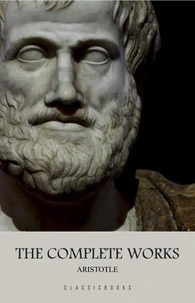Aristotle's "The Poetics" stands as a foundational text in the study of literary theory and dramatic criticism. Through a meticulous analysis of tragedy, epic poetry, and the principles underlying successful storytelling, Aristotle elucidates concepts such as catharsis, mimesis, and the unities of time, place, and action. His systematic approach not only highlights the mechanics of these literary forms but also engages with broader philosophical inquiries, positioning literature as a mirror to human experience.
Written in a clear and methodical style, the work reflects the intellectual milieu of ancient Greece, emphasizing empirical observation and rational thought, marking it as a precursor to both aesthetic and narrative theory in Western literature. Aristotle (384-322 BCE), a towering figure in Western philosophy, made significant contributions across disciplines including ethics, politics, metaphysics, and, of course, literary criticism.
His engagement with the works of his predecessors, especially that of Plato, and his interactions with the performing arts in Athens, informed his insights into the nature of art and its impact on society. This background in empirical observation and discourse shaped Aristotle's belief in art as an essential reflection of human nature, compelling him to analyze its form and structure systematically in "The Poetics." I highly recommend "The Poetics" to anyone interested in a deeper understanding of literature, drama, and the intricate relationship between narrative and truth.
Aristotle'Äôs arguments remain relevant, challenging readers to consider not only the mechanics of storytelling but also its moral and philosophical implications. This text is essential for aspiring writers, scholars, and anyone fascinated by the enduring power of the written word.
Aristotle's "The Poetics" stands as a foundational text in the study of literary theory and dramatic criticism. Through a meticulous analysis of tragedy, epic poetry, and the principles underlying successful storytelling, Aristotle elucidates concepts such as catharsis, mimesis, and the unities of time, place, and action. His systematic approach not only highlights the mechanics of these literary forms but also engages with broader philosophical inquiries, positioning literature as a mirror to human experience.
Written in a clear and methodical style, the work reflects the intellectual milieu of ancient Greece, emphasizing empirical observation and rational thought, marking it as a precursor to both aesthetic and narrative theory in Western literature. Aristotle (384-322 BCE), a towering figure in Western philosophy, made significant contributions across disciplines including ethics, politics, metaphysics, and, of course, literary criticism.
His engagement with the works of his predecessors, especially that of Plato, and his interactions with the performing arts in Athens, informed his insights into the nature of art and its impact on society. This background in empirical observation and discourse shaped Aristotle's belief in art as an essential reflection of human nature, compelling him to analyze its form and structure systematically in "The Poetics." I highly recommend "The Poetics" to anyone interested in a deeper understanding of literature, drama, and the intricate relationship between narrative and truth.
Aristotle'Äôs arguments remain relevant, challenging readers to consider not only the mechanics of storytelling but also its moral and philosophical implications. This text is essential for aspiring writers, scholars, and anyone fascinated by the enduring power of the written word.

 , qui est-ce ?
, qui est-ce ?